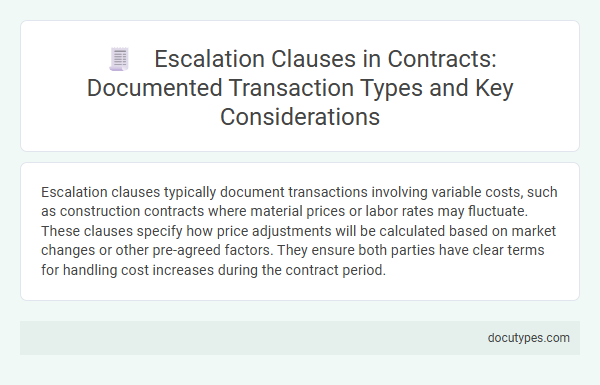Escalation clauses typically document transactions involving variable costs, such as construction contracts where material prices or labor rates may fluctuate. These clauses specify how price adjustments will be calculated based on market changes or other pre-agreed factors. They ensure both parties have clear terms for handling cost increases during the contract period.
Introduction to Escalation Clauses in Contracts
| Topic | Description |
|---|---|
| Introduction to Escalation Clauses | Escalation clauses are provisions in contracts that allow for adjustments in payment or price based on predetermined factors. They are designed to protect parties from unforeseen changes in market conditions or costs during the contract term. |
| Types of Transactions Documented | Common transactions include construction contracts, supply agreements, and service contracts where material costs, labor rates, or inflation may fluctuate over time. These clauses specify the metrics triggering price changes. |
| Commodity Price Adjustments | Contracts involving raw materials such as steel, oil, or lumber often include escalation clauses to account for volatile commodity prices, ensuring fair compensation aligned with market shifts. |
| Labor Cost Changes | Service contracts that rely on labor rates may document escalation clauses tied to wage index changes, union agreements, or inflation indexes to maintain equitable pricing. |
| Inflation-Based Adjustments | Escalation clauses frequently use consumer price index (CPI) or other inflation metrics to adjust contract amounts in long-term agreements, safeguarding against currency value erosion. |
| Scope of Application | Escalation clauses are most common in industries affected by frequent cost fluctuations, including construction, manufacturing, and logistics, facilitating risk management and financial predictability. |
Common Documented Transaction Types Using Escalation Clauses
Escalation clauses commonly document transactions involving price adjustments based on fluctuations in material costs, labor rates, or market indices. These clauses are often used in construction contracts, supply agreements, and long-term service contracts to manage financial risks. Typical documented transaction types include changes in raw material prices, wage increases, and shifts in transportation or energy costs.
Escalation Clauses in Real Estate Agreements
Escalation clauses in real estate agreements document specific types of transactions related to price adjustments based on competing offers or market changes. These clauses protect buyers and sellers by automatically increasing the offer price under predefined conditions.
- Price Adjustment - The clause specifies the conditions under which the purchase price will increase in response to higher competing bids.
- Market Fluctuations - Escalation clauses can include provisions adjusting the price according to changes in market indices or property valuations.
- Competing Offers Documentation - You provide evidence of other bona fide offers, triggering the escalation mechanism to match or exceed those bids.
Application in Construction Contracts
Escalation clauses in construction contracts primarily document price adjustments related to fluctuations in material costs, labor rates, and fuel expenses. These clauses provide a structured method to address unforeseen economic changes during the project timeline.
Typical transactions include variations in steel, concrete, and other essential building materials, as well as increases in wages and transportation fees. This ensures both contractors and clients maintain financial fairness and project feasibility despite market volatility.
Use in Procurement and Supply Agreements
Escalation clauses document specific types of transactions that adjust contract prices based on variable factors. These clauses are crucial in procurement and supply agreements to manage cost fluctuations effectively.
- Material Price Changes - Escalation clauses account for fluctuations in raw material costs affecting the overall contract price.
- Labor Cost Adjustments - Wage increases or changes in labor rates are documented to ensure fair compensation throughout the contract term.
- Inflation and Economic Indexes - Contracts include provisions tied to inflation rates or economic indexes to protect against purchasing power erosion.
Key Drafting Elements for Escalation Clauses
Escalation clauses commonly document transactions involving fluctuating costs such as raw materials, labor, and construction expenses. These clauses protect parties from unforeseen price increases by adjusting contract amounts based on specific cost indices or market rates.
Key drafting elements for escalation clauses include clearly defining the triggering events and applicable cost indices, such as the Consumer Price Index (CPI) or Producer Price Index (PPI). The clause must specify the method for calculating adjustments and include timeframes for applying changes. Precise language reduces ambiguity and minimizes disputes over price escalations.
Legal and Regulatory Considerations
Escalation clauses in contracts document transactions subject to changes in costs or prices due to legal and regulatory developments. These clauses ensure that your agreements remain compliant with evolving laws and mitigate financial risks associated with regulatory shifts.
- Construction and Supply Contracts - These transactions often include escalation clauses to adjust prices based on changes in material costs or labor laws.
- Energy and Utilities Agreements - Escalation clauses address fluctuations in regulatory fees, tariffs, or environmental compliance costs.
- Government Procurement Contracts - Clauses account for modifications in statutory taxes, duties, or compliance mandates that affect contract pricing.
Properly drafted escalation clauses protect contractual relationships by aligning transaction terms with legal and regulatory frameworks.
Risk Assessment and Mitigation Strategies
What types of transactions are commonly documented in escalation clauses? Escalation clauses typically document transactions involving fluctuating costs such as raw materials, labor, and fuel prices. These clauses help in allocating risk and implementing mitigation strategies to manage financial uncertainties.
Best Practices for Documentation and Implementation
Escalation clauses commonly document transactions involving price adjustments due to changes in material costs, labor rates, or market indexes. Best practices for documentation include clearly defining the trigger events, specifying the calculation method for adjustments, and setting limits or caps to control the escalation scope. Your contract should incorporate precise language and require regular reviews to ensure the clause remains fair and enforceable throughout the contract term.
What Types of Transactions Are Documented in Escalation Clauses? Infographic

